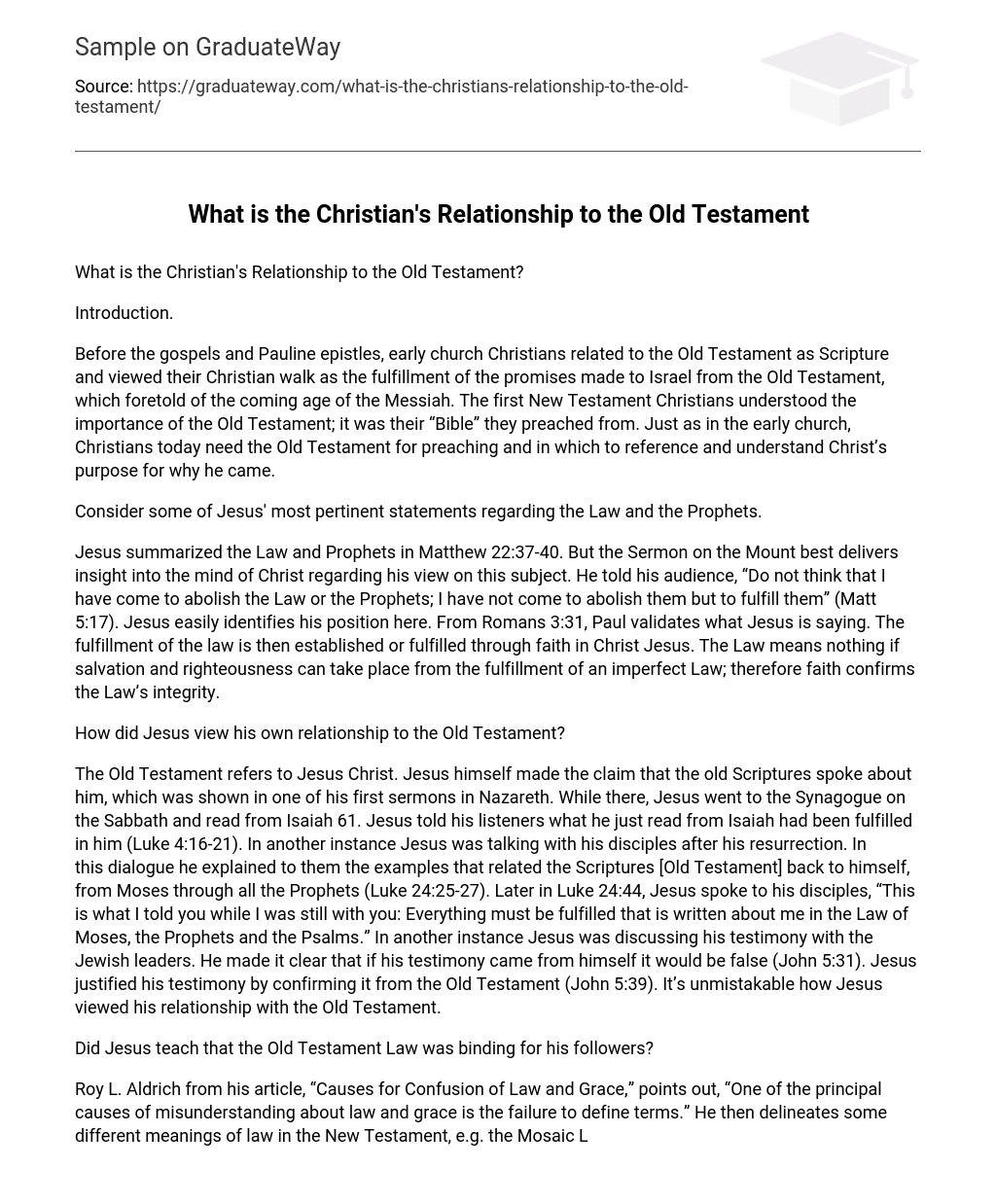What is the Christian’s Relationship to the Old Testament?
Introduction.
Before the gospels and Pauline epistles, early church Christians related to the Old Testament as Scripture and viewed their Christian walk as the fulfillment of the promises made to Israel from the Old Testament, which foretold of the coming age of the Messiah. The first New Testament Christians understood the importance of the Old Testament; it was their “Bible” they preached from. Just as in the early church, Christians today need the Old Testament for preaching and in which to reference and understand Christ’s purpose for why he came.
Consider some of Jesus’ most pertinent statements regarding the Law and the Prophets.
Jesus summarized the Law and Prophets in Matthew 22:37-40. But the Sermon on the Mount best delivers insight into the mind of Christ regarding his view on this subject. He told his audience, “Do not think that I have come to abolish the Law or the Prophets; I have not come to abolish them but to fulfill them” (Matt 5:17). Jesus easily identifies his position here. From Romans 3:31, Paul validates what Jesus is saying. The fulfillment of the law is then established or fulfilled through faith in Christ Jesus. The Law means nothing if salvation and righteousness can take place from the fulfillment of an imperfect Law; therefore faith confirms the Law’s integrity.
How did Jesus view his own relationship to the Old Testament?
The Old Testament refers to Jesus Christ. Jesus himself made the claim that the old Scriptures spoke about him, which was shown in one of his first sermons in Nazareth. While there, Jesus went to the Synagogue on the Sabbath and read from Isaiah 61. Jesus told his listeners what he just read from Isaiah had been fulfilled in him (Luke 4:16-21). In another instance Jesus was talking with his disciples after his resurrection. In this dialogue he explained to them the examples that related the Scriptures [Old Testament] back to himself, from Moses through all the Prophets (Luke 24:25-27). Later in Luke 24:44, Jesus spoke to his disciples, “This is what I told you while I was still with you: Everything must be fulfilled that is written about me in the Law of Moses, the Prophets and the Psalms.” In another instance Jesus was discussing his testimony with the Jewish leaders. He made it clear that if his testimony came from himself it would be false (John 5:31). Jesus justified his testimony by confirming it from the Old Testament (John 5:39). It’s unmistakable how Jesus viewed his relationship with the Old Testament.
Did Jesus teach that the Old Testament Law was binding for his followers?
Roy L. Aldrich from his article, “Causes for Confusion of Law and Grace,” points out, “One of the principal causes of misunderstanding about law and grace is the failure to define terms.” He then delineates some different meanings of law in the New Testament, e.g. the Mosaic Law (Matt 22:37–40); The Law of Christ (Gal 6:2; Jas 1:25; 2:12); Law as Principle (Rom 3:27; 8:2) and The Pentateuch (Luke 24:44). He goes on to point out that there is contrasting difference between the Mosaic Law and the moral law. The Mosaic Law was filled with, “ceremonial law, civil law, criminal law, sanitary law, governmental law. But the moral law existed before Moses, and continues after the Cross.”
Did Jesus bind modern day Christians to these different attributes of the Mosaic Law only or moral law only or both? Paul R. Schmidtbleicher distinguishes between two different thoughts on this. Westminster Confession claims that Jesus and the New Testament abrogated the Mosaic Law only in portions; whereas Dispensationalists see the Law of Moses as one whole unit, not divided and its entirety was abolished. He takes the position that the Mosaic Law and any other definition of law in Scripture is under the “umbrella” of God’s Eternal Law. This eternal law, which surpasses all others, is as eternal as God himself. According to Schmidtbleicher, we are not under the external Mosaic Law any more, but under the New Testament Internal-Spirit led law. If Schmidtbleicher is right then it would seem that what Jesus spoke in Matthew 22:37-40 coincides with this thinking.
Conclusion.
Having a perspective of Jesus Christ from the Old Testament benefits our Christian progress and preaching as Sidney Greidanus states, “Since the New Testament implies that the Old Testament bears witness to Jesus Christ, we can preach Jesus from the Old Testament with hermeneutical integrity.” If we are to have a relationship with Christ and Christ himself shows us his relationship with the Old Testament then it displays the importance the Old Testament applies to our Christian walk.
Bibliography
Aldrich, Roy L. “Causes for Confusion of Law and Grace Confusion of Law and Grace.” Bibliotheca Sacra 463, no. Jul (1959): 222–229. Gonzalez, Justo L. The Story of Christianity, Volume I: The Early Church to the Dawn of the Reformation. Second Edi. New York, NY: HarperCollins, 2010. Greidanus, Sidney. “Preaching Christ from the Old Testament.” Bibliotheca Sacra 641, no. Jan (2004): 4–13. Hodges, Zane C. “Law And Grace In The Millennial Kingdom II . Law in the Millennial Kingdom III . Destroying the Law.” Journal of the Grace Evangelical Society 38, no. Spring (2007): 32–38. Schmidtbleicher, Paul R. “Balancing The Use Of The Old Testament.” Chafer Theological Seminary Journal 3, no. Jul (2002): 40–62.





